Charles E W Bean, Diaries, AWM38 3DRL 606/113/1 - May - June 1918 - Part 8
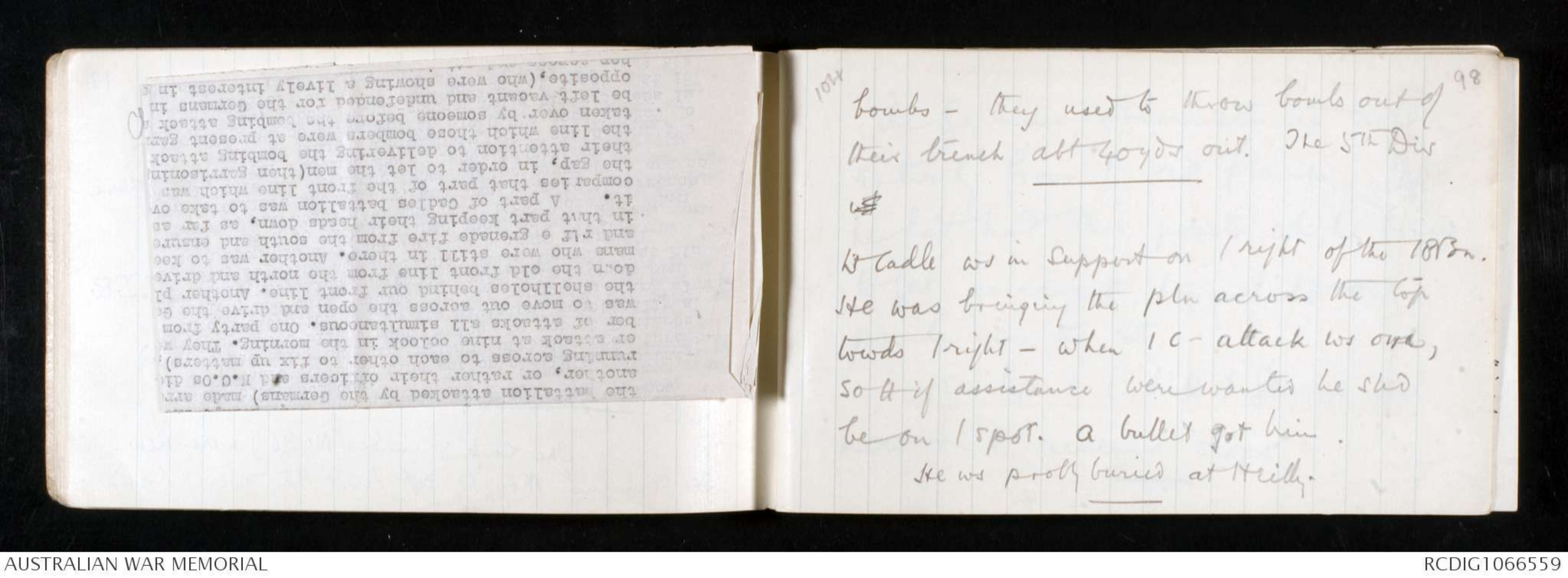
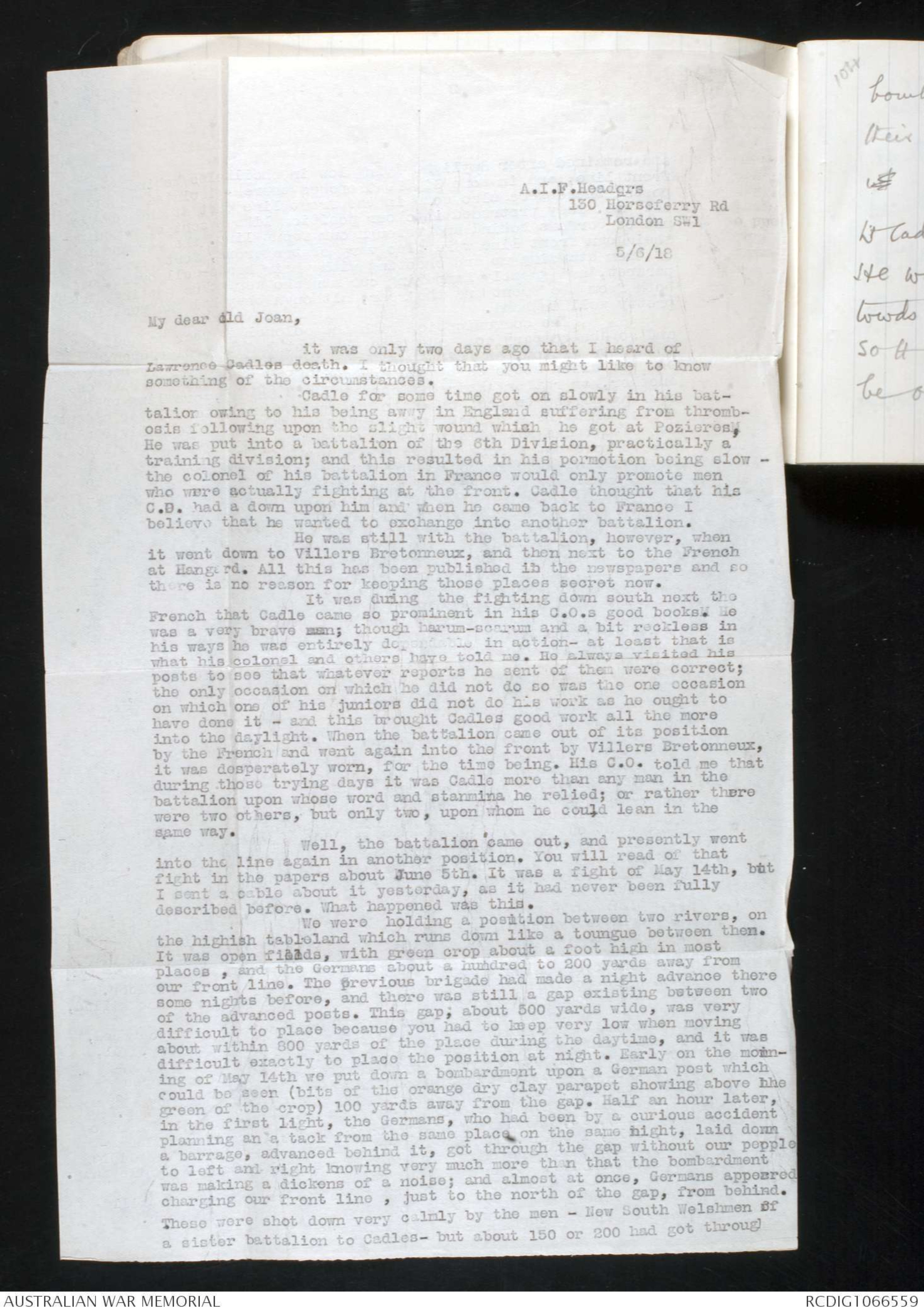
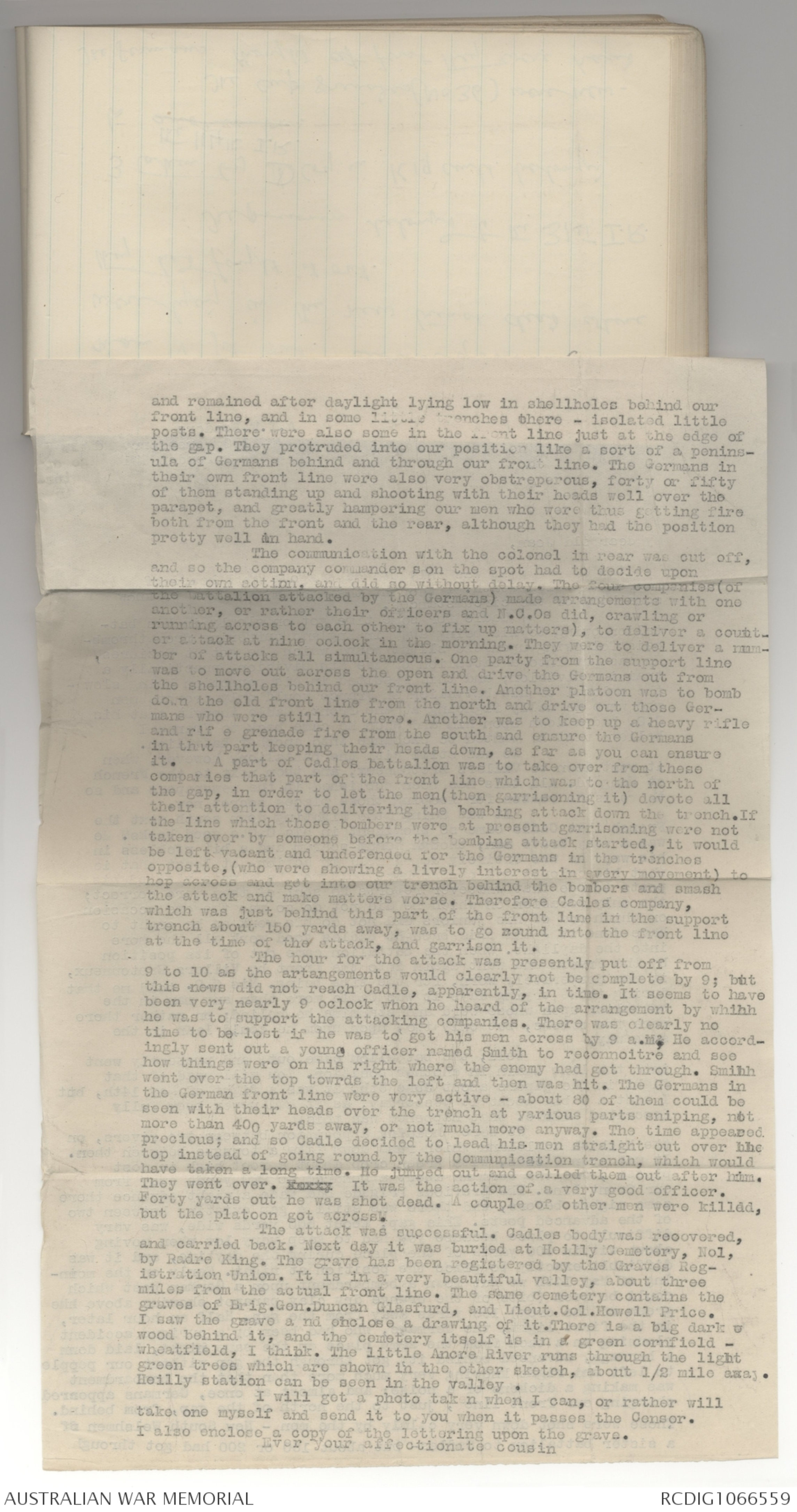
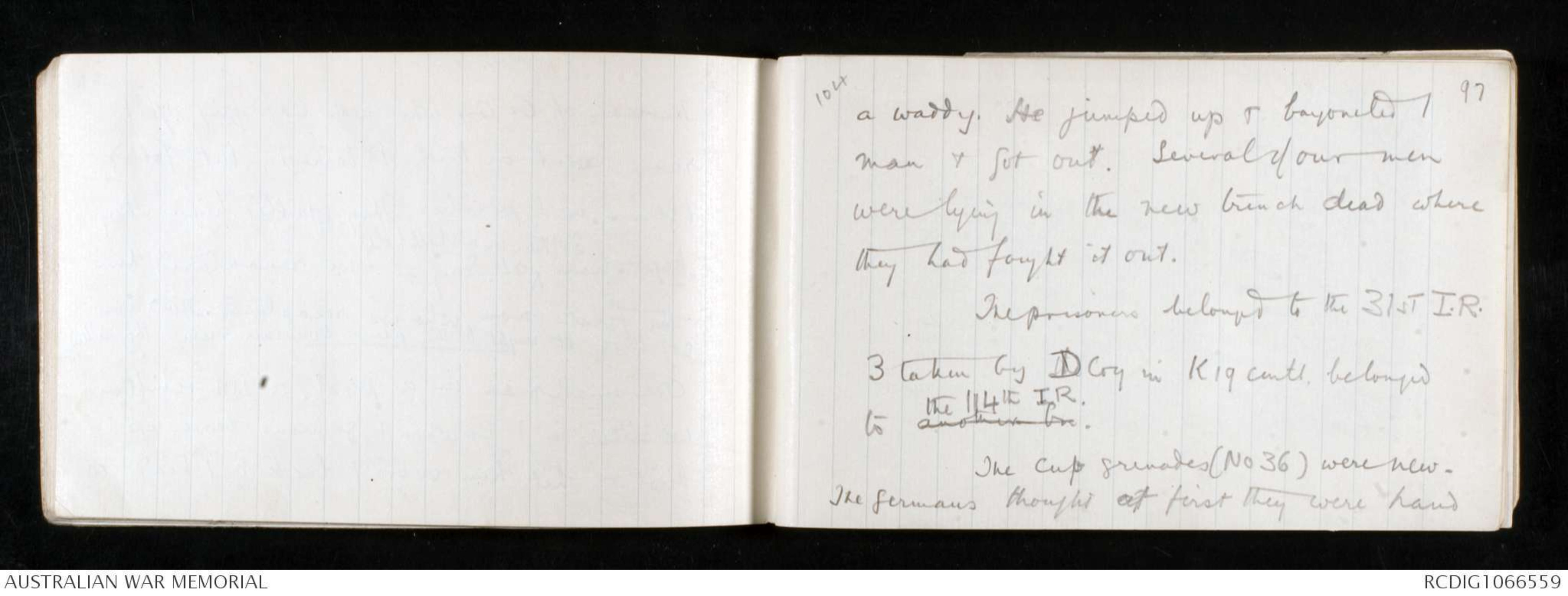
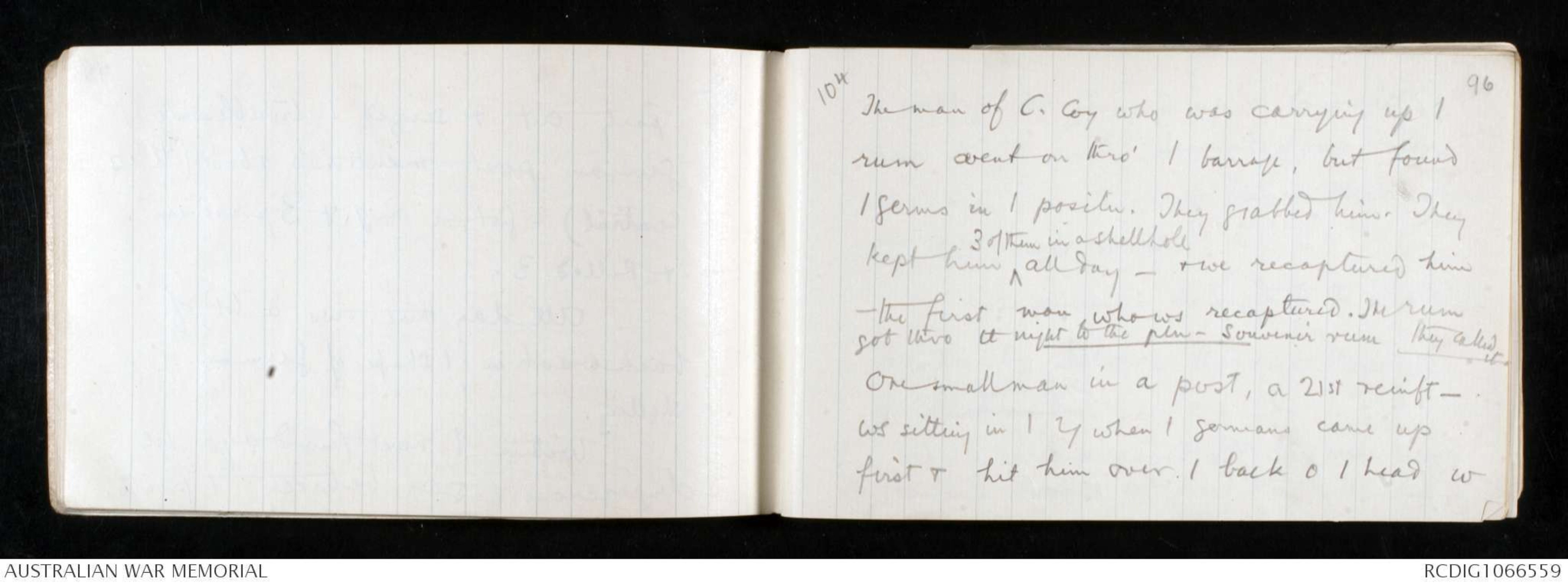
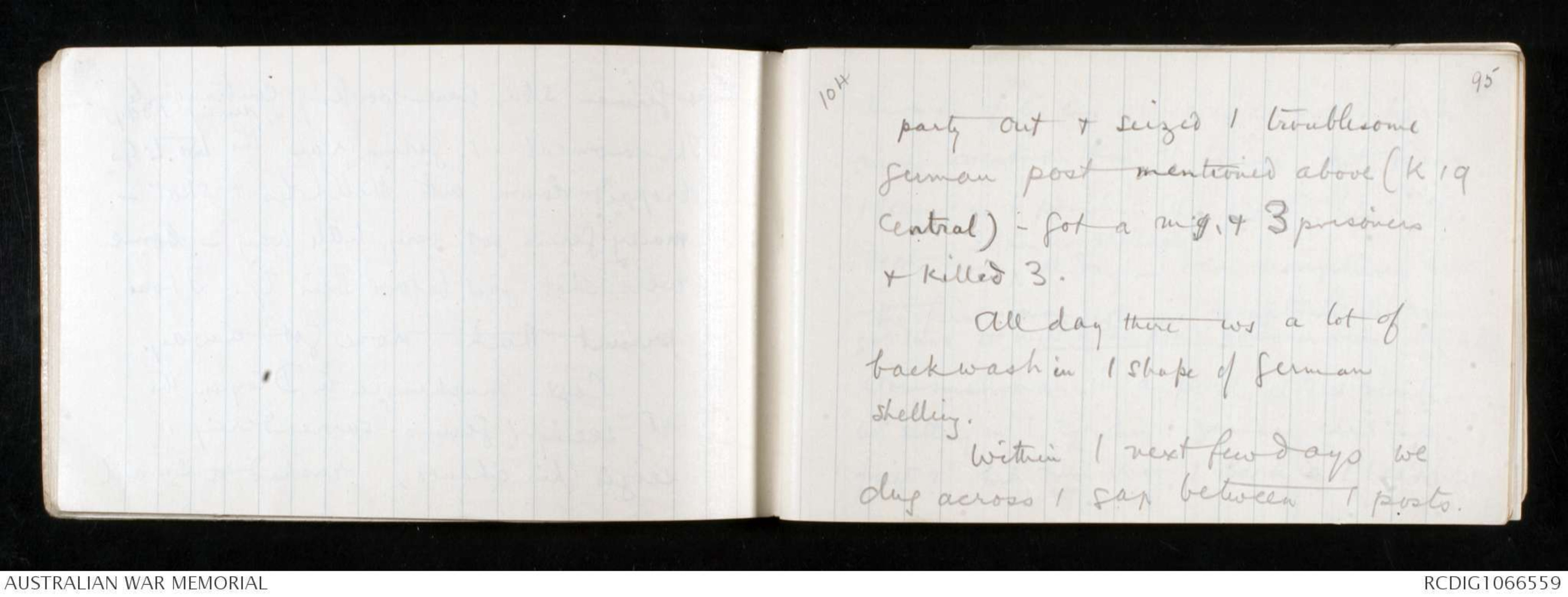
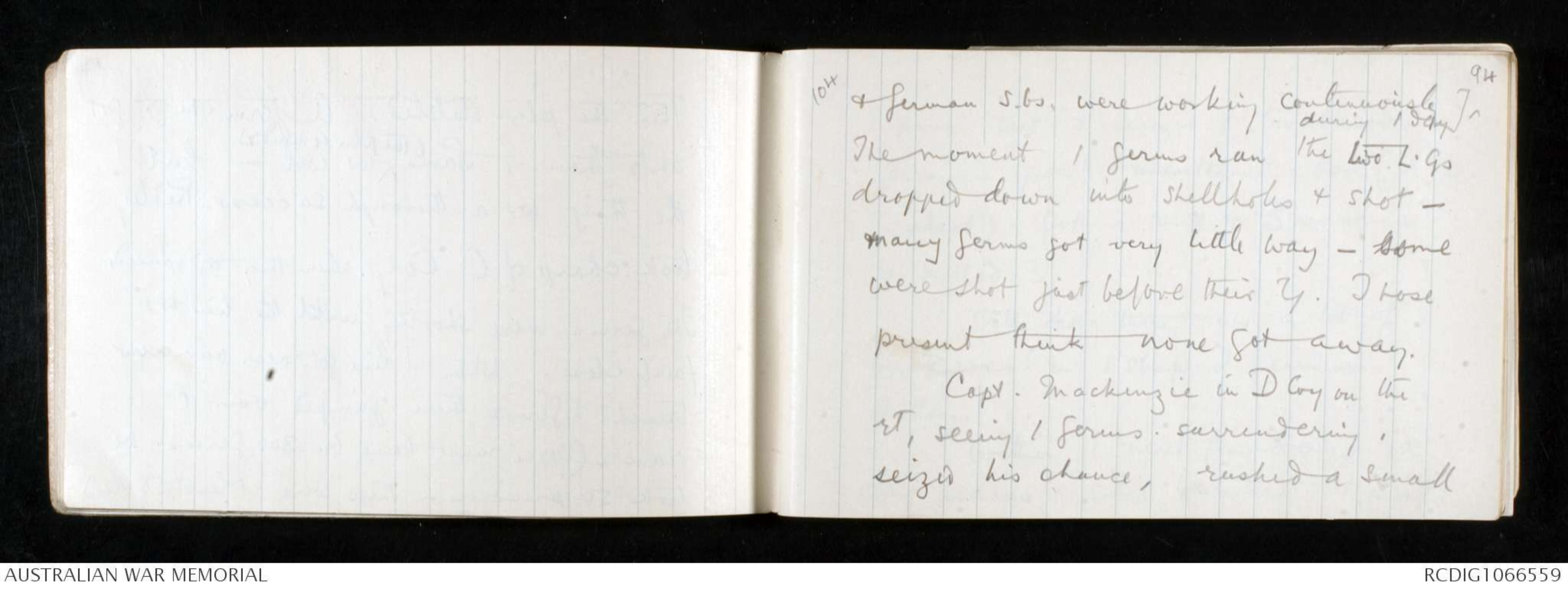
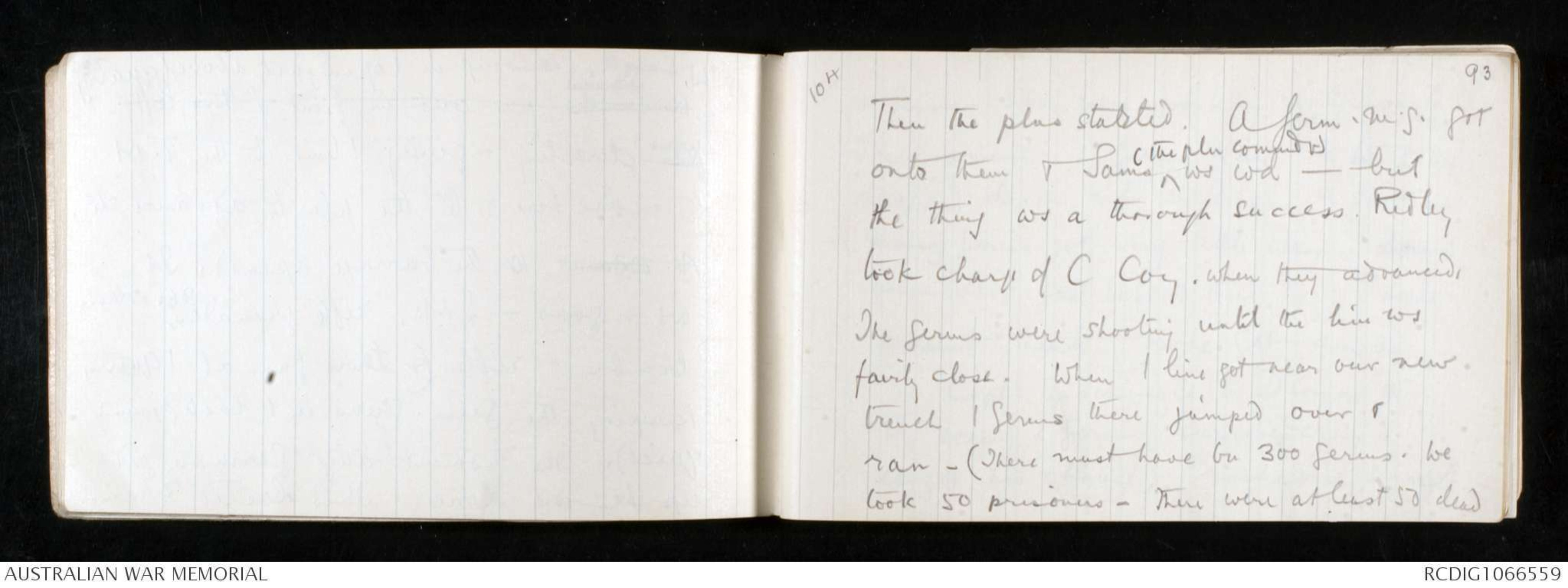
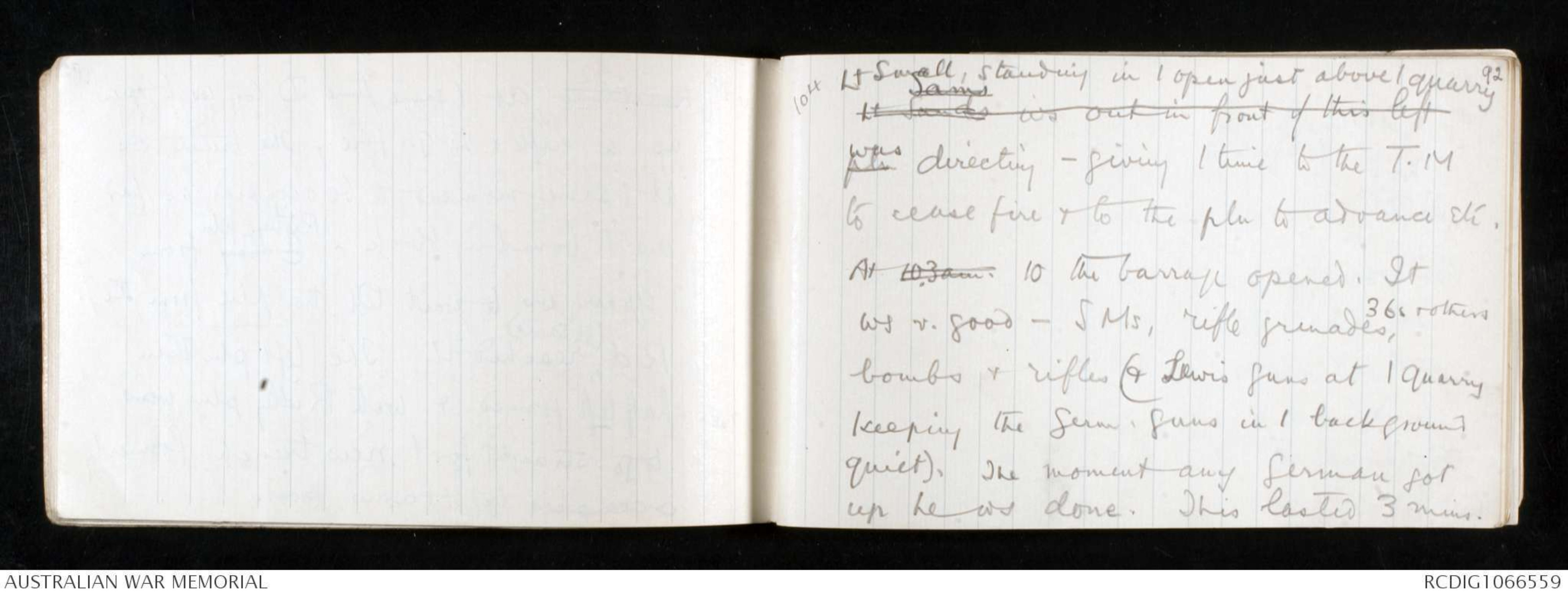
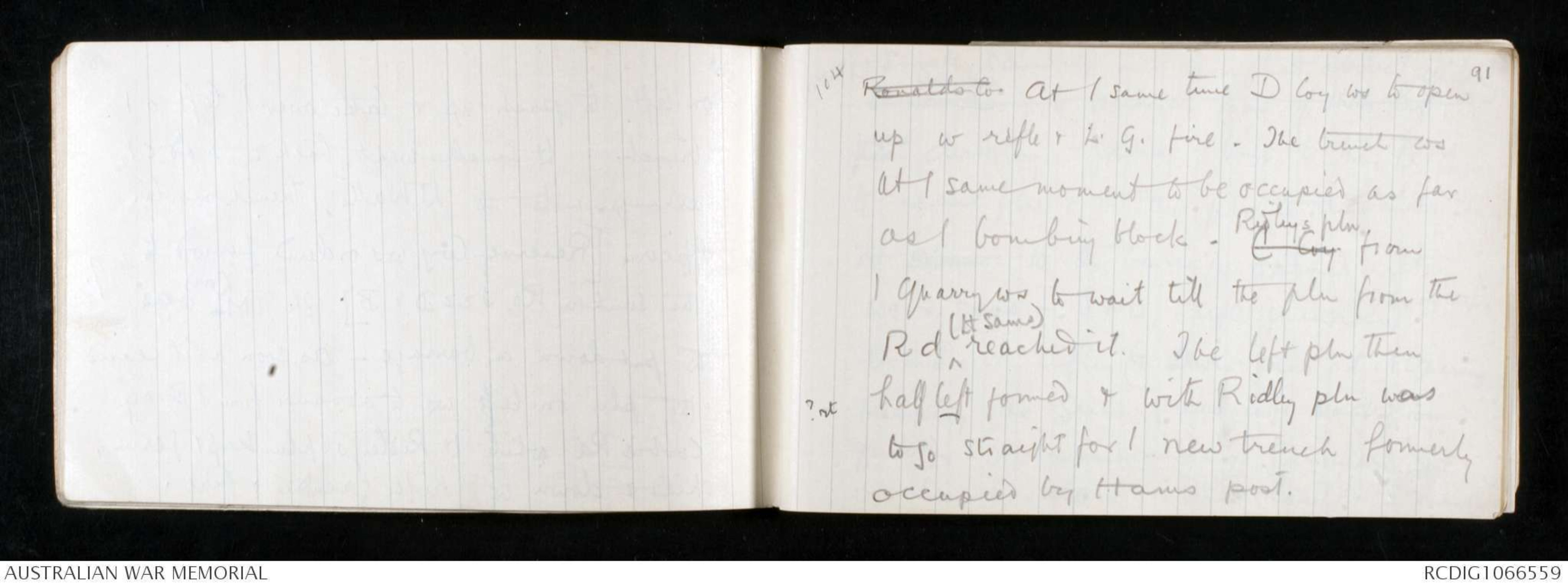
the battalion attacked by the Germans) made arr
another, or rather their officers and N.C.O.s did
running across to each other to fix up matters)
or attack at nine o'clock in the morning. They w
ber of attacks all simultaneous. One party from
was to move out across the open and drive the Ge
the shellholes behind our front line. Another pl
down the old front line from the north and drive
mans who were still in there. Another was to kee
and rif e grenade fire from the south and ensure
in that part keeping their heads down, as far as
it. A part of Cadles battalion was to take ov
companies that part of the front line which was
the gap, in order to let the men (then garrisonin
their attention to delivering the bombing attack
the line which those bombers were at present gar
taken over by someone before the bombing attack
be left vacant and undefended for the Germans in
opposite, (who were showing a lively interest in
104 98
bombs - they used to throw bombs out of
their trench abt 40 yds out. The 5th Divwd
Lt Cadle ws in support on / right of the 18 Bn.
He was bringing the pln across the top
towds / right – when / c-attack ws ond,
so tt if assistance were wanted he shd
be on / spot. A bullet got him.
He ws probly buried at Heilly.
A.I.F.Headqrs
130 Horseferry Rd
London SW1
5/6/18
My dear old Joan,
It was only two days ago that I heard of
Lawrence Cadles death. I thought that you might like to know
something of the circumstances.
Cadle for some time got on slowly in his battalion
owing to his being away in England suffering from thrombosis
following upon the slight wound which he got at Pozieres,
He was put into a battalion of the 6th Division, practically a
training division; and this resulted in his promotion being slow -
the colonel of his battalion in France would only promote men
who were actually fighting at the front. Cadle thought that his
C.O. had a down upon him and when he came back to France I
believe that he wanted to exchange into another battalion.
He was still with the battalion, however, when
it went down to Villers Bretonneux, and then next to the French
at Hangard. All this has been published in the newspapers and so
there is no reason for keeping those places secret now.
It was during the fighting down south next the
French that Cadle came so prominent in his C.O.s good books. He
was a very brave man; though harum-scarum and a bit reckless in
his ways he was entirely dependable in action - at least that is
what his colonel and others have told me. He always visited his
posts to see that whatever reports he sent of them were correct;
the only occasion on which he did not do so was the one occasion
on which one of his juniors did not do his work as he ought to
have done it - and this brought Cadles good work all the more
into the daylight. When the battalion came out of its position
by the French and went again into the front by Villers Bretonneux,
it was desperately worn, for the time being. His C.O. told me that
during those trying days it was Cadle more than any man in the
battalion upon whose word and stanmina he relied; or rather there
were two others, but only two, upon whom he could lean in the
same way.
Well, the battalion came out, and presently went
into the line again in another position. You will read of that
fight in the papers about June 5th. It was a fight of May 14th, but
I sent a cable about it yesterday, as it had never been fully
described before. What happened was this.
We were holding a position between two rivers, on
the highish tableland which runs down like a toungue between then.
It was open fields, with green crop about a foot high in most
places, and the Germans about a hundred to 200 yards away from
our front line. The previous brigade had made a night advance there
some nights before, and there was still a gap existing between two
of the advanced posts. This gap, about 500 yards wide, was very
difficult to place because you had to keep very low when moving
about within 800 yards of the place during the daytime, and it was
difficult exactly to place the position at night. Early on the morning
of May 14th we put down a bombardment upon a German post which
could be seen (bits of the orange dry clay parapet showing above hhe
green of the crop) 100 yards away from the gap. Half an hour later,
in the first light, the Germans, who had been by a curious accident
planning an attack from the same place on the same night, laid down
a barrage, advanced behind it, got through the gap without our people
to left and right knowing very much more than that the bombardment
was making a dickens of a noise; and almost at once, Germans appeared
charging our front line, just to the north of the gap, from behind.
These were shot down very calmly by the men - New South Welshmen of
a sister battalion to Cadles - but about 150 or 200 had got throug)
and remained after daylight lying low in shellholes behind our
front line, and in some little trenches there - isolated little
posts. There were also some in the front line just at the edge of
the gap. They protruded into our position like a sort of a peninsula
of Germans behind and through our front line. The Germans in
their own front line were also very obstreperous, forty or fifty
of them standing up and shooting with their heads well over the
parapet, and greatly hampering our men who were thus getting fire
both from the front and the rear, although they had the position
pretty well in hand.
The communication with the colonel in rear was cut off,
and so the company commander s on the spot had to decide upon
their own action, and did so without delay. The four companies (of
the battalion attacked by the Germans) made arrangements with one
another, or rather their officers and N.C.Os did, crawling or
running across to each other to fix up matters), to deliver a counter
attack at nine oclock in the morning. They were to deliver a number
of attacks all simultaneous. One party from the support line
was to move out across the open and drive the Germans out from
the shellholes behind our front line. Another platoon was to bomb
down the old front line from the north and drive out those Germans
who were still in there. Another was to keep up a heavy rifle
and rif e grenade fire from the south and ensure the Germans
in that part keeping their heads down, as far as you can ensure
it. A part of Cadles battalion was to take over from these
companies that part of the front line which was to the north of
the gap, in order to let the men (then garrisoning it) devote all
their attention to delivering the bombing attack down the trench. If
the line which those bombers were at present garrisoning were not
taken over by someone before the bombing attack started, it would
be left vacant and undefended for the Germans in the trenches
opposite, (who were showing a lively interest in every movement) to
hop across and get into our trench behind the bombers and smash
the attack and make matters worse. Therefore Cadles company,
which was just behind this part of the front line in the support
trench about 150 yards away, was to go round into the front line
at the time of the attack, and garrison it.
The hour for the attack was presently put off from
9 to 10 as the artangements would clearly not be complete by 9; but
this news did not reach Cadle, apparently, in time. It seems to have
been very nearly 9 oclock when he heard of the arrangement by whihh
he was to support the attacking companies. There was clearly no
time to be lost if he was to get his men across by 9 a.M, He accordingly
sent out a young officer named Smith to reconnoitre and see
how things were on his right where the enemy had got through. Smith
went over the top towrds the left and then was hit. The Germans in
the German front line were very active - about 80 of them could be
seen with their heads over the trench at yarious parts sniping, not
more than 400 yards away, or not much more anyway. The time appeared
precious; and so Cadle decided to lead his men straight out over the
top instead of going round by the Communication trench, which would
have taken a long time. He jumped out and called them out after him.
They went over. Xxxxx It was the action of a very good officer.
Forty yards out he was shot dead. A couple of other men were killdd,
but the platoon got across.
The attack was successful. Cadles body was recovered,
and carried back. Next day it was buried at Heilly Cemetery, No1,
by Padre King. The grave has been registered by the Graves Registration
Union. It is in a very beautiful valley, about three
miles from the actual front line. The same cemetery contains the
graves of Brig.Gen.Duncan Glasfurd, and Lieut.Col.Howell Price.
I saw the grave a nd ehclose a drawing of it. There is a big dark o
wood behind it, and the cemetery itself is in a green cornfield -
wheatfield, I think. The little Ancre River runs through the light
green trees which are shown in the other sketch, about 1/2 mile away.
Heilly station can be seen in the valley.
I will get a photo taken when I can, or rather will
take one myself and send it to you when it passes the Censor.
I also enclose a copy of the lettering upon the grave.
Ever your affectionate cousin
104 97
a waddy. He jumped up & bayoneted /
man & got out. Several of our men
were lying in the new trench dead where
they had fought it out.
The prisoners belonged to the 31st I.R.
3 taken by D Coy in K 19 centl. belonged
to another bn. the 114th I.R.
The cup grenades (No 36) were new.
The Germans thought at first they were hand
104 96
The man of C. Coy who was carrying up /
rum went on thro' / barrage, but found
/ Germs in / positn. They grabbed him. They
kept him ^3 of them in a shellhole all day - & we recaptured him
- the first man who ws recaptured. The rum
got thro tt night to the pln- souvenir rum, they called it.
One small man in a post, a 21st reinft -
ws sitting in / trench when / Germans came up
first & hit him over / back o / head w
104 95
party out & seized / troublesome
German post mentioned above (K 19
Central) - got a m.g. & 3 prisoners
& killed 3.
All day there was a lot of
backwash in / shape of German
shelling.
Within / next few days we
dug across / sap between / posts.
104 94
& German s.bs. were working continuously
during / day]
The moment / Germs ran the two. L.Gs
dropped down into shellholes & shot -
many Germs got very little way - some
were shot just before their trench. Those
present think none got away.
Capt. Mackenzie in D Coy on the
rt, seeing / Germs surrendering
seized his chance, rushed a small
104 93
Then the plns started. A Germ m.g. got
onto them & Sams ^(the pln commdr) ws wd - but
the thing ws a thorough success. Ridley
took charge of C Coy. when they advanced,
The Germs were shooting until the line ws
fairly close. When / line got near our new
trench / Germs there jumped over &
ran - (There must have bn 300 Germs. We
took 50 prisoners - There were at least 50 dead
104 92
Lt Small standing in / open just above / quarryLt Sands Sams ws out in front of this leftpln was directing - giving / time to the T.M
to cease fire & to the pln to advance etc.
At 10.3 am. 10 the barrage opened. It
ws v. good - S Ms, rifle grenades, 36s & others
bombs & rifles (& Lewis guns at / Quarry
keeping the Germ. guns in background
quiet). The moment any German got
up he ws done. This lasted 3 mins.
104 91Ronalds Co At / same time D Coy ws to open
up w rifle & L. G. fire. The trench ws
at / same moment to be occupied as far
as / bombing block. C Coy Ridleys pln from
/ Quarry ws to wait till the pln from the
Rd ^(Lt Sams) reached it. The left pln then
[* ?rt*]
half left formed & with Ridley pln was
to go straight for / new trench formerly
occupied by Hams post.
 Deb Parkinson
Deb ParkinsonThis transcription item is now locked to you for editing. To release the lock either Save your changes or Cancel.
This lock will be automatically released after 60 minutes of inactivity.